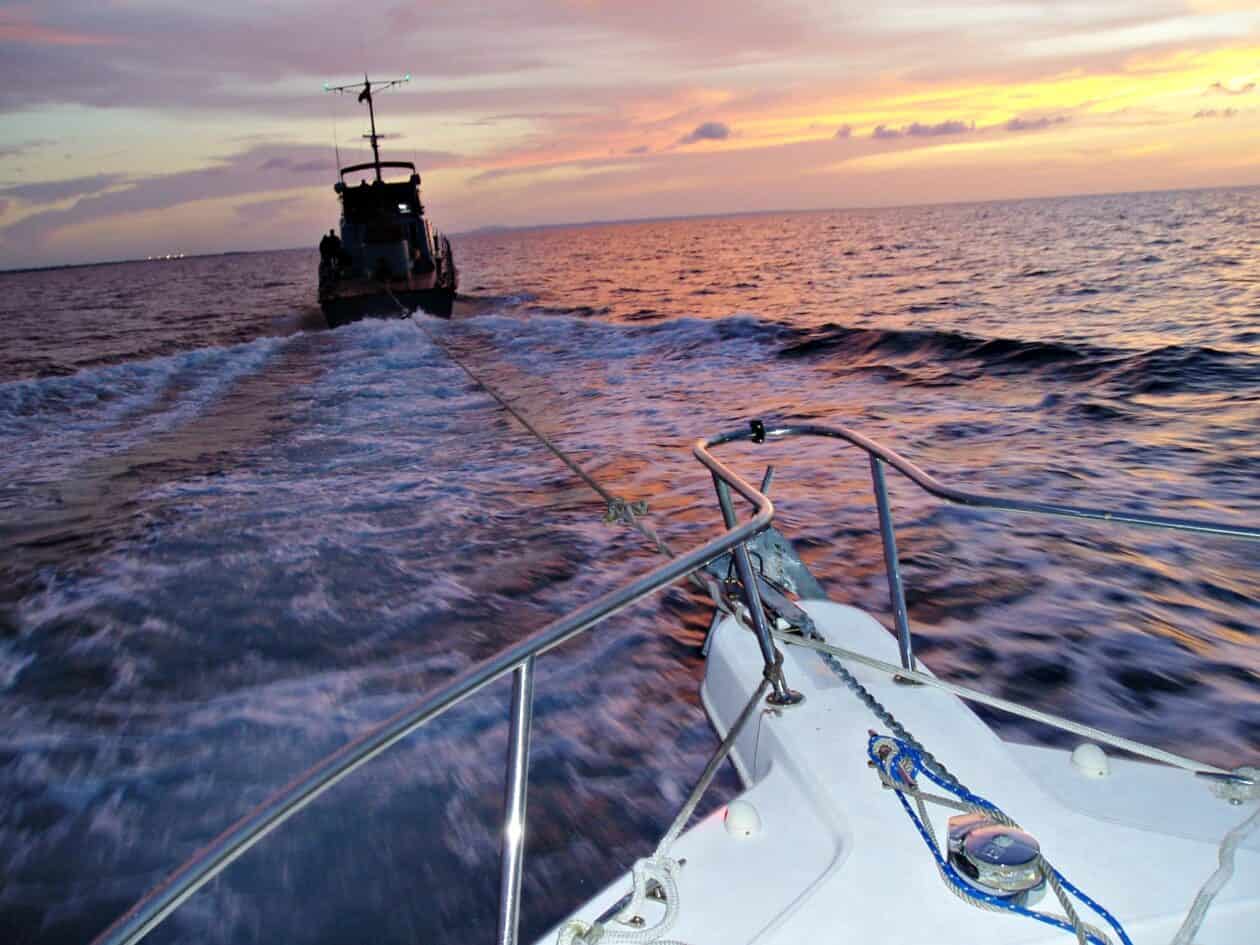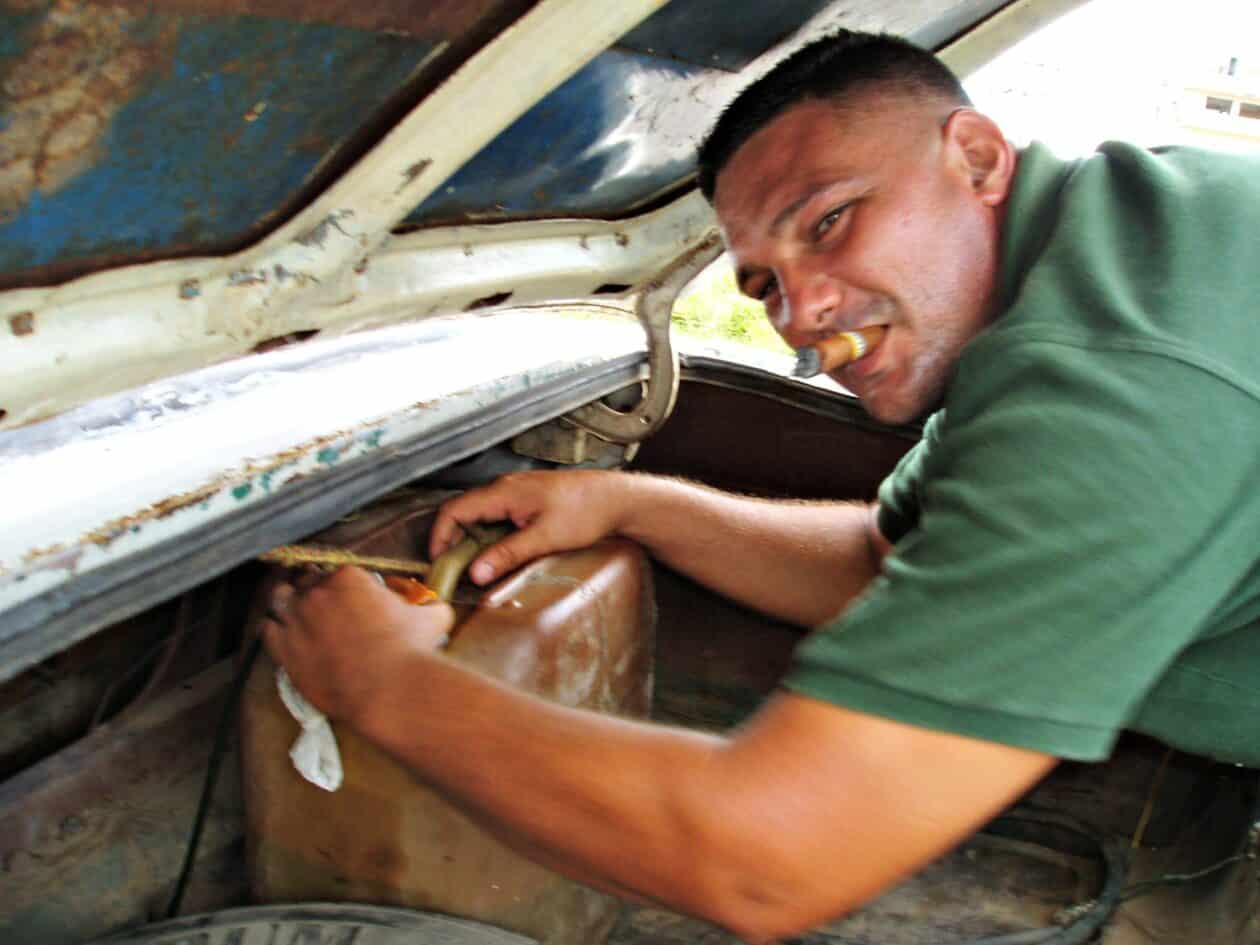ASK FOR DIRECTIONS (to Cuba)
It’s tough enough for one lost man to ask for directions—tougher when four guys sail into the unknown.

Unexpected rewards for loyalty are divine. In the summer of 2005, I visited the off-limits island of Cuba. At the time, Fidel Castro was aged but still healthy and in power. I was the monthly travel columnist for The Improper Hamptonian, an amusing print magazine for Long Islanders. When the editor fled to start her own venture (Long Island Pulse), she invited me to write a similar column in her new magazine, which paid more. That is, only if I ceased writing for the other magazine.
I pleaded to write original columns for both publications, but the offer only stood if I cut my ties to the magazine in which I’d been a regular contributor for years. For maintaining my loyalty—I was the only columnist who did—the publisher off The Improper Hamptonian offered me a trip to Cuba by boat from the Florida Keys.
6:43p.m. Just off Cuba’s coast, as we’re scouring the shoreline for an inlet leading to a port, two huge boats race towards us.
6:44p.m. “Give us your keys,” they shout to our boat.
“Why?” I scream back. I’d never been mugged by pirates, so I dash below deck to stash valuables on my body. Back on deck, I can’t argue with the impatient, AK47-wielding crews on the steely larger boats flanking ours. Only one of the 20 guys on either boat wears anything resembling a uniform. Both boats have big cannons, and nobody is smiling. After a useless protest against surrendering the keys, I throw them the keys and the line they use to tow us into port. They then start “the investigation.”
7:28p.m. Waiting on the dock is a 50-person convoy of drug-sniffing dog handlers, scribbling policemen, brooding military personnel, doctors, interrogators, and interpreters. Welcome to Cuba!
Americans having to fly through Mexico, Canada, or elsewhere to visit the largest island in the Caribbean has always struck me as tedious. I wanted to conquer Cuba by boat, and The Improper Hamptonian publisher, Lenny, made it happen. For years, he had pondered venturing there with his father, Lenny, Sr., a retired steamfitter of merit who had previously traveled there by boat. Lenny, Jr., and I flew to Fort Lauderdale, boarded his dad’s 30-foot fishing boat, the Steamfitter, motored south and soon reaffirmed: The adventure begins when the plan fails.
Although our captain planned on docking near Havana, headwinds burned more gas than expected, so the straight line from Marathon Key, FL, led to the marina in Varadero, 80 miles east of Havana. As Cuban soil rose into view, we made several unsuccessful attempts to radio the marina. Roaming 100-yards offshore, hunting for the inlet, the only other boat we’d seen in Cuban waters was a dilapidated 120-foot rusty vessel that kept its distance but mimicked our movements. When we turned and approached them to ask directions, another rusting steel beast raced onto the scene, and our vacation went into shock, just as the sun began to sink into the ocean.
9 p.m.—until the moon finishes its slow arc across sky. They search and pick apart the boat, as I occasionally nap on the comfy wooden dock, using a pylon base as a pillow.
A team of quarantine doctors follow the drug-sniffing dogs.
“Anybody want a soda?” asks Lenny, Jr.
10:50p.m. A young female physician gives us full physicals. Using the pilot’s bench as an exam table, she probes our abdomens and wears an expression of deep concern. She suggests the captain keep his legs elevated, and returns later to retake his blood pressure.
1:33a.m. A technology expert steps on to the boat, gives us nods of confidence, and then completely dismantles each of our cell phones, taking ferocious notes about each part and their serial numbers. Spy stuff.
3:54a.m. I become keenly aware that several stone-faced men are photographing and filming the entire show because when the cameraman films part four of my nap, his camera light wakes me.
Tensions were spiking again between Cuba and America. The previous year, Bush and company sanctioned Swiss banks for the “laundering” of Cuban currency. Cuba’s retaliation, starting in 2004, outlawed the previously common U.S. dollar for all goods and services, switched to the Euro, and imposed a 20-percent fee for mandatory dollar conversions. And, Yanks arriving unannounced by boat also became a tad more problematic. Technically, while it’s not illegal for Americans to visit Cuba, U.S. law declares it illegal for them to spend U.S. dollars there.
6:16a.m. Detainment by Cuban Coast Guard and friends continues through sunrise.
6:17a.m. Emerging from a dream about missing a meal while in solitary confinement because my Spanish is rusty, I wonder aloud if we should call a lawyer. Lenny, nursing an imported Coke, winks, “Spending that quarter could multiply our legal problems.”
6:18a.m. “Ham sandwich, please,” says our captain. The Captain’s cryptic request dawns on me later. We have no food, only cases of beer and soda.
10a.m. Officials, in a variety of outfits ranging from medaled general to sly undercover detective, test-drive our boat for the second time.
11:11a.m. Undercover dude seats us outside the grilling office near the dock and formally permits us access to our bucket of beer and soda.
11:12a.m.—until the sun sets again. They interrogate us individually in a small windowless office. Using a Spanish-speaking quizzer with an interpreter, high-volume questions range from “Do you have any Cuban friends in the United States?” to “Have you ever been in trouble with the CIA?” Four other serious padre types look on without blinking. Thoughtfully, the interrogator skipped any real toughies, like, “Who is cooler, you, or your older brother?”
2p.m. Mildly panicked paranoia sets in. Cuban detention takes me back to the many hours I’d restlessly endured in my junior high school principal’s office. “We’re calling your parents,” I think I hear someone mumble in Spanish. Images of a $10,000 Uncle Sam fine and a year in prison swirl in my head.
3p.m. Every two hours, I peek back into the interrogation chamber—two olden computer printers busily chugging propaganda—to ask when we’ll be free to go enjoy their country’s famous tranquilizing rhythms. They maintain poker faces and predict a few more hours. “We’re checking with your government,” says the interpreter. Is he joking? If I’m here trading with the enemy, why the hell are you calling Washington? Am I going to become an international media example, exposing the flipside of the Cuban refugee boating issue?
4p.m. Revelation: It’s amazing that Cuba is only 90 miles from Florida, because the cultural differences fly in the face of proximity. I’ve visited hundreds of diverse cultures and seldom experienced such lifestyle variation in such a short distance. Typically, when I’m in travel-writer mode, I intentionally wander into bad neighborhoods to get the street beat in towns all over the world. On the other side of those tracks, I’m used to paranoid locals first screening me as possible DEA, FBI, CIA, or Immigration. It seems ironic to raise that intelligence antenna in Cuba when I’m actually attempting a vacation. Then again, remnants of the Cold War endure.
4:01p.m. I want my mom.
4:02p.m. “Gimme another ham sandwich.” —Captain’s code words for “Someone please deliver me another Miller Lite.”
7:05p.m. We’re still slumped in chairs outside the administrative cell as another sun sets. A Canadian boat dweller muses by and attempts to illustrate the bright side of Cuba’s militarized bureaucracy: “Thick bureaucracy, thin crime.”
7:15p.m. Our 24-hour detention concludes with an apology.
Lack of radio communication aside, we had no idea that our beachfront search for the inlet had raised red flags. Occasionally, speed boat mercenaries do storm beaches and ferry locals to Florida. And, some cell phones have GPS chips that could help navigate a rafting refugee seeking diplomatic immunity. Considering our phone dismantlings, you’d think they were hunting lasers. Who knows what else prompted their paranoia. Obviously, most Cubans can’t afford boats, but you also don’t see anybody in any sort of recreational floating devices near the beaches. The Cuban government discourages Cubans from floating on anything. It’s even illegal for foreign boat visitors to use the kayaks they’ve brought along; any craft could become a local’s ticket to a Dolphin’s game.
For sure, very few Americans storm their shores by sea, and their lawmen didn’t seem to have much going on otherwise. If it was an embargo formality, at least they now have a training video for ambushing and shaking down weekend warriors.
7:37p.m. Group discussion in a Havana-bound taxi cab. Perhaps the adage about men refusing to ask for directions when lost has merit—the rare moment when the four of us asked at once, the banana hit the fan.
11:25a.m. (one week later). On the boat ride back to Florida, we see only one other boat from afar as we cross from Cuban into international waters.
“Oh sh*t, is that the U.S. Coast guard?”…“Dump the cigars!”




